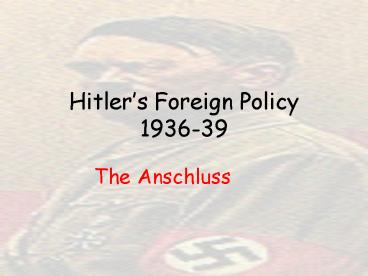Hitlers Foreign Policy 193639 - PowerPoint PPT Presentation
1 / 18
Title:
Hitlers Foreign Policy 193639
Description:
Since coming to power, the Nazi's had financed and encouraged the Austrian Nazi Party. Campaign of intimidation and terror carried ... Historiography on Memo ... – PowerPoint PPT presentation
Number of Views:102
Avg rating:3.0/5.0
Title: Hitlers Foreign Policy 193639
1
Hitlers Foreign Policy1936-39
- The Anschluss
2
Anschluss union of Germany and Austria
- Since coming to power, the Nazis had financed
and encouraged the Austrian Nazi Party - Campaign of intimidation and terror carried out,
Englebert Dollfuss, Chancellor of Austria had to
suppress party
3
Assassination
- Nazis assassinated Dolfuss in 1934 as part of an
attempted coup détat to force the union
4
Italian Response
- International alarm was widespread.
- Mussolini, who had no desire for a common
frontier with Hitler, sent 100,000 troops to
Italys border with Austria - Hitler taken aback by the reaction, forced to
disown the attempt to join Austria/Germany
5
Italian Response
- Mussolini was aware that South Tyrol, which they
had gained after ww1 from Austria had a
substantial German minority - Feared that Germans would use Austria as a base
to undermine Italys influence in the Balkans
6
Background to Hitlers policy towards Austria
- Hitlers success in re-militarising the Rhineland
in March 1936 had strengthened Germanys position
in Europe - Germany was now less vulnerable to attack and was
in a position to influence diplomatic affairs,
rather than just being the victim of what other
nations decided (Versailles) - This new confidence became evident in several
tactical steps that Germany took
7
Austro- German Agreement in 1936
- Germany again recognised Austrian independence
- Both powers agreed not to interfere in each
others internal affairs
8
Austro- German Agreement in 1936
- Austria would conduct her foreign policy in line
with her being a German state - Result it increased Germanys influence over
Austria - Secret clauses prominent Nazis were to have a
share in political responsibility
9
Events prior to Anschluss
- July 1936 Spanish Civil War started. Germany
offered limited but important military support to
help the Fascist rebels under General Franco
- Nov 1936 Germany and Italy signed an agreement
known as the Rome-Berlin axis, agreed to share a
common foreign policy - Austria preserved for the time being
10
Events prior to Anschluss
- However only a year later in November 1937,
Mussolini ( after a tour of Germany where he had
been impressed by the organisation and strength
of the Nazi state) stated that he was no longer
interested in preserving Austrias independence
This British cartoon from 1938 shows Hitler as a
poacher, stealing Austria. Mussolini is shown
as a bad game-keeper. I never heard a shot,
Adolf, he is saying.
11
(No Transcript)
12
Events prior to Anschluss
- In January 1937 Hitler made a speech, the time
for so called surprises has ended no major
events took place this year
13
Hossbach Conference 5th Nov 1937
- Memo from this meeting fell into allied hands
after the war - This has provided material for the argument over
whether Hitler was following a programme of
conquest or was he merely seizing chances
presented to him
14
The Hossbach Memorandum
- Meeting between Hitler, his foreign and war
ministers and chiefs of Army,Navy and Air Force - Colonel Hossbach took notes of the meeting.Hitler
gave a review of Germanys future foreign policy
aims including opportunities in Austria (otto),
Czechoslovakia(green) and Poland(white) - He called these cases and gave them names .
15
The Hossbach Memorandum
- Germany must be ready for war by 1938 and at the
latest by 1943-45 or the other powers would catch
up in the arms race - Germany would always be faced by two
hate-inspired antagonists, Britain and France
16
The Hossbach Memorandum
- The aim of German policy was to secure and
preserve the racial community and to enlarge it.
It was therefore a matter of space
17
Historiography on Memo
- Many historians who believe that Hitler planned
for war, accept the idea of the memorandum was
evidence that the Nazis had sought war as a
matter of policy
Hitler accepts the ovation of the Reichstag after
announcing the 'peaceful' acquisition of Austria,
1938/03
18
Historiography on Memo
- In Origins of the Second World War AJP Taylor
dismissed the Hossbach evidence. - He argues that the meeting was held to convince
military and financial experts used by the Nazis
of the need to continue with the expansive
rearmament programme































